Here’s the comprehensive list of Korean phrases that you’ll need to join in on the fun and converse in Korean. This is the up-to-date modern version of how Koreans actually talk, so it will be useful if you want to learn how to speak Korean.
To get you started, here are some basic phrases you can use to speak Korean:
- Yes – 네 (ne)
- No – 아니요 (a-ni-yo)
- Hello – 안녕하세요 (an-nyeong-ha-se-yo)
- Thank you – 고맙습니다 (go-map-seum-ni-da)
- You’re welcome – 천만에요 (cheon-man-e-yo)
- Excuse me – 실례합니다 (sill-ye-ham-ni-da)
- Ok – 괜찮아요 (gwaen-chan-a-yo)
- I don’t know – 몰라요 (mollayo)
- Sorry – 미안합니다 (mi-an-ham-ni-da)
- Goodbye – 안녕히 가세요 (an-nyeon-ghi ga-se-yo)
If you need this list of basic Korean words and phrases to take with you on the go, we’ve got you covered! Forget the dated Korean guidebooks or confusing phrases that don’t make sense. This list of common words and phrases will give you exactly what you need to speak in Korean for your next adventure in Korea. We’ll provide the phrases with the alphabet and romanization.
The PDF download is right here:
Contents
- 1 Tips Before You Start Learning Korean Phrases
- 2 Basic Korean Phrases
- 3 Common Korean Phrases
- 4 Easy Korean Phrases
- 5 Simple Korean Phrases
- 6 Korean Phrases for Beginners
- 7 Formal Korean Phrases
- 8 Informal Korean Phrases
- 9 Korean Phrases to Know
- 10 Popular Korean Phrases
- 11 Korean Conversation Phrases
- 12 Korean Expressions
- 12.1 Restaurant Korean Phrases
- 12.2 Cafe & Coffee Shop Korean Phrases
- 12.3 Shopping Korean Phrases
- 12.4 Dry Cleaner Korean Phrases
- 12.5 Bank Korean Phrases
- 12.6 Hospital Korean Phrases
- 12.7 Pharmacy Korean Phrases
- 12.8 Dentist Korean Phrases
- 12.9 Hair Salon Korean Phrases
- 12.10 Movie Theater & Cinema
- 12.11 Post Office Korean Phrases
- 13 Korean Travel Phrases
- 14 Useful Korean Phrases
- 14.1 Dinner Table Korean Phrases
- 14.2 Korean Small Talk Phrases
- 14.3 Meeting Friends Korean Phrases
- 14.4 Special Occasion Korean Phrases
- 14.5 Phone Call Korean Phrases
- 14.6 Mobile Phone Korean Phrases
- 14.7 Korean Exclamations
- 14.8 Impress the Locals
- 14.9 Talking with the Landlord Korean Phrases
- 14.10 Apartment Search Korean Phrases
- 14.11 Dating & Romance Korean Phrases
- 14.12 Taxi Korean Phrases
- 14.13 Emergency Korean Phrases
- 14.14 Encouragement Korean Phrases
- 15 Special Korean Phrases
- 16 Formal vs Informal Korean Phrases
- 17 Other helpful resources for learning Korean
- 18 Wrap Up
Tips Before You Start Learning Korean Phrases
Below, we’ve got the most important phrases in the Korean language that you need to learn, broken down by category. We’ve written the most common Korean words and phrases using the Korean alphabet. We will also include the audio for the Korean phrases so you can practice your pronunciation.
Before you start learning the phrases, we highly recommend you learn the Korean alphabet (Hangeul) ASAP. To effectively learn Korean sentences, phrases, or words, it is an essential first step to improve your Korean language skills. It’ll help you speak the Korean language and correctly pronounce the basic Korean phrases you’ll find below.
Read on and study the Korean phrases section by section. Or, skip ahead to the Korean phrases you want to speak most and add them to your favorite flashcard deck. Click on the word next to the yellow speaker to hear the audio pronunciation of the Korean phrase.
Most important of all, have fun with them!
Basic Korean Phrases
Need the bare minimum sentences for casual conversations using the Korean language? These are the basic Korean phrases you’ll want to get down to make sure your time in Korea is smooth sailing!
You might notice that there are a few ways of saying some of the basic Korean phrases, such as “excuse me,” “thank you,” and “goodbye.” In English, these phrases are much more multi-purpose. In Korean, there are specific phrases that you’ll use for certain situations. It’s important to know when to use these basic Korean phrases, especially when you’re in South Korea. The different situations make learning the Korean language fun and interesting.
Click on the word in Hangul to hear the pronunciation of each basic Korean phrase. To learn more about the phrases in detail, click on the English equivalent of the phrase.
| English | 한국어 (Korean) |
|---|---|
| Thank You | (gomapseumnida) |
| Don’t mention it | (cheonmaneyo) |
| Sorry | (mianhamnida) |
| That’s OK | (gwaenchanayo) |
| Hello | (annyeonghaseyo?) |
| Excuse me (to get attention) | (jeogiyo) |
| Excuse me (to apologize) | (sillyehamnida) |
| Excuse me (to pass someone) | (jamsimanyo) |
| Hello (on phone) | (yeoboseyo) |
| Good morning | (annyeonghaseyo?) |
| Good evening | (annyeonghaseyo?) |
| Sleep well | (jal jayo) |
| Sweet dreams | (joeun kkum kkwoyo) |
| Goodbye (to person leaving) | (annyeonghi gaseyo) |
| Goodbye (to person staying) | (annyeonghi gyeseyo) |
| Get home safely | (jal gayo) |
| Have a nice day | (joeun haru bonaeseyo) |
| Have a good trip! | (yeohaeng jalhaseyo) |
| Welcome | (hwanyeonghamnida) |
| Yes | (ne) |
| No | (aniyo) |
| Maybe | (amado) |
| Just a moment! | (jamkkanmanyo!) |
| I feel sick | (apayo) |
| I need a doctor | (uisaga piryohaeyo) |
| Take me to the hospital (to taxi) | (byeongwone gajuseyo) |
In the Korean language, there are a few different ways to say “thank you.” You may also hear 고마워요 (gomawoyo) and 감사합니다 (gamsahamnida).
In the basic Korean phrases above, we gave you the most common way to thank someone. Go here if you’d like to learn more about the different ways to say “thank you” in Korean.
Common Korean Phrases
As you continue with your Korean learning, focus on these common Korean phrases and sentences that will be used on a daily basis. You can use them when you meet friends or speak to the staff at the local market.
When you’re asking questions in Korean, make sure to speak with an upwards intonation toward the end of the sentences. You should say the sentence as if you’re unsure.
You’ve got the Korean phrases necessary to have simple interactions, so now’s the time to put your language skills to use!
| English | 한국어 (Korean) | Romanization |
|---|---|---|
| Where is the bathroom? | hwajangsireun eodie isseoyo? | |
| Please repeat that | dasi malhae juseyo | |
| Please speak slowly | cheoncheonhi malhae juseyo | |
| Please write it down | jeogeo juseyo | |
| I understand | ihaehaeyo | |
| I don’t understand | ihae mothaeyo | |
| I don’t know | mollayo | |
| I know | arayo | |
| Can you speak Korean? | hangungmareul hal su isseoyo? | |
| I can speak a little Korean | hangungmareul jogeum hal su isseoyo | |
| I can’t speak Korean | hangungmareul motaeyo | |
| How do you say tiger in Korean? | taigeoga hangungmallo mwoyeyo? | |
| How much is this? | igeo eolmayeyo? | |
| I’ll be right back! | geumbang gatda olgeoyeyo! | |
| What is this? | ige mwoyeyo | |
| Don’t worry! | geokjeong haji maseyo! | |
| No problem! | munje eopseoyo | |
| Good | joayo | |
| Bad | an joayo | |
| So-so | geujeo geuraeyo |
A great way to speak these basic Korean phrases on a daily basis is to plan on using one phrase each day. Write it down on an index card, and say it whenever the opportunity comes up. It takes a few minutes of planning, but you will thank yourself later when you have a strong repertoire of things to say.
Easy Korean Phrases
Easy Korean phrases are words and phrases that have easy Korean pronunciation. These Korean words and phrases are often used in Korean dramas.
Below is a list of words and phrases that will help you start speaking Korean.
| English | 한국어 (Korean) | Romanization |
|---|---|---|
| Yes | ne | |
| No | aniyo | |
| Maybe | amado | |
| I feel | apayo | |
| I know | arayo | |
| Good | joayo | |
| Bad | an joayo | |
| I don't know | mollayo | |
| Sleep well | jal jayo | |
| Get home safely | jal gayo | |
| Of course | dangyeonajyo | |
| I’m hungry | baegopayo | |
| I understand | ihaehaeyo |
Simple Korean Phrases
These are simple Korean phrases that you’ll first learn as you begin learning the Korean language. These words also have easy Korean pronunciation so it won’t be challenging learning and speaking them.
These words and phrases are often used in Korean dramas and daily conversations among Koreans.
Here’s a list of simple Korean phrases you can start with:
| English | 한국어 (Korean) |
|---|---|
| Hello | (annyeonghaseyo) |
| Thank you | (gamsahamnida) |
| You’re welcome | (cheonmaneyo) |
| I’m sorry | (mianhamnida) |
| It’s okay | (gwaenchanayo) |
| Congratulations | (chukahaeyo) |
| Hello (over the phone) | (yeoboseyo) |
| Excuse me | (sillyehamnida) |
| Please don’t worry | (geokjeong hajimaseyo) |
| Long time no see | (oraenmanieyo) |
| It’s delicious | (masisseoyo) |
| I’m thirsty | (mok mallayo) |
Korean Phrases for Beginners
In this section, you’ll learn Korean phrases for beginners. When you’re starting to learn the Korean language, these are the phrases you can start with. This time the words and phrases are a bit longer, but the Korean pronunciation isn’t difficult.
For example, the Korean word 도와주세요 (dowajuseyo) has longer spelling, but its Korean pronunciation isn’t difficult. It’ll help you say the Korean word easier if you know how to read Hangeul.
Here’s a list of Korean phrases for beginners to help you in speaking Korean:
| English | 한국어 (Korean) |
|---|---|
| Goodbye | (annyeonghi gyeseyo) |
| Goodbye | (annyeonghi gaseyo) |
| Just a moment | (jamkkanmanyo) |
| Nice to meet you | (mannaseo bangapseumnida) |
| Have you eaten? | (bap meogeosseoyo) |
| Thank you for this meal | (jal meogetseumnida) |
| No problem | (munje eopseoyo) |
| I don’t understand | (ihae mot haeyo) |
| Please speak slowly | (cheoncheonhi mal haejuseyo) |
| How much is this? | (eolmaeyo) |
| Have a nice day | (joheun haru bonaeseyo) |
| Please give me a menu | (menyupan juseyo) |
| Be careful | (josimhaseyo) |
| Please help me | (dowajuseyo) |
Formal Korean Phrases
Formal Korean phrases are used when you’re speaking to someone who is older than you or who holds a higher position or social hierarchy than you. You may also use these phrases with people who you are close with, but you want to show or give them respect.
Here are a few of the common formal Korean phrases you can start learning:
| English | 한국어 (Korean) |
|---|---|
| I like it | (joseumnida) |
| I don’t like it | (silseumnida) |
| Nice to meet you | (mannaseo bangapseumnida) |
| See you next time! | (daeume bwayo) |
| Thank you | (gomapseumnida) |
| See you tomorrow | (naeil bwayo) |
| I’m sorry | (mianhamnida) |
| What are you doing? | (mwo hamnikka) |
| How are you? | (jal jinaesyeosseoyo) |
Informal Korean Phrases
Informal Korean Phrases are usually used when you’re speaking to your friends, people who have the same age as you, or someone who’s younger than you.
You wouldn’t use these with people who are older than you. These phrases would sound rude when used to speak with people older than you.
Here are a few common informal Korean phrases you can use with your friends:
| English | 한국어 (Korean) |
|---|---|
| Yes | (eung) |
| No | (ani) |
| Hi/ Bye | (annyeong) |
| Please | (jebal) |
| Okay | (geurae) |
| Thanks | (gomawo) |
| I like it | (joa) |
| I don’t like it | (sireo) |
| I’m sorry | (mianhae) |
| See you next time/ See you | (daeume bwa) |
| See you tomorrow | (naeil bwa) |
| Nice to meet you | (mannaseo bangawo) |
| What are you doing? | (mwo hae) |
| How are you? | (jal jinae) |
| How's it going? | (yojeum eottae) |
Is the Korean phrase 안녕 (annyeong) “Hello” or “Goodbye”?
You might be curious why 안녕 (annyeong) is translated to “hi/bye” in the table above. In the video below, we’ll answer the question of whether 안녕 (annyeong) means “hello” or “goodbye.”
Korean Phrases to Know
As you’re learning the Korean language, these words and phrases are a few of the many that you first need to know. These are helpful words and phrases that you can use when speaking. These are also words to look out for when you watch a Korean drama or listen to your favorite K-Pop idol’s live programs.
Below is a list of the Korean words and phrases you need to know:
| English | 한국어 (Korean) |
|---|---|
| Hello | (annyeonghaseyo) |
| Nice to meet you | (mannaseo bangapseumnida) |
| Thank you | (gamsahamnida) |
| Please give | (juseyo) |
| How much is it? | (eolmayeyo) |
| Please give discount | (kkakkajuseyo) |
| Please wait a moment | (jamsiman gidaryeo juseyo) |
| I don't understand | (ihae mot haeyo) |
Popular Korean Phrases
Popular Korean phrases are those that many Korean learners learned first. This is because these are words often used in K-dramas, movies, or even in K-Pop songs.
Here’s a list of a few of the many popular Korean phrases:
| English | 한국어 (Korean) | Romanization |
|---|---|---|
| I love you | saranghaeyo | |
| Hello | annyeonghaseyo | |
| Thank you | gamsahamnida | |
| It’s okay | gwaenchanayo | |
| I know | arayo | |
| I don’t know | mollayo | |
| I miss you | bogo sipeoyo | |
| I like you | joahaeyo | |
| It’s delicious | masisseoyo |
Korean Conversation Phrases
When you’re starting to learn the Korean language, getting to speak Korean in conversations is the goal. There are many Korean conversation phrases but we’ve listed a few of them here.
You can use these common Korean phrases with a friend or someone you just met.
Here are a few of the most common Korean conversation phrases you can learn and use.
| English | 한국어 (Korean) |
|---|---|
| Hello | (annyeonghaseyo) |
| Is everything all right? | 별일 없지요? (byeolil eobsjiyo?) |
| Long time no see | 오랜만이다 (orenmanida) |
| Nice to meet you | (mannaseo bangapseumnida) |
| What’s your name? | (ireumi mwoyeyo?) |
| How old are you? | (myeot sarieyo?) |
| Where are you from? | 어디 출신이세요? (eodi chulsiniseyo?) |
| Where do you work? | 어디에서 일해요? (eodieseo ilhaeyo?) |
| Can you speak Korean? | 한국어 할 수 있습니까? (hangugeo hal su isseumnikka?) |
| Can you speak English? | 영어 할 수 있습니까? (yeongeo hal su isseumnikka?) |
| What does this mean? | 무슨 뜻이에요? (museun tteusieyo?) |
| Please say that one more time. | 다시 한 번 말해 주세요. (dasi han beon malhae juseyo) |
| Please write it down. | 적어 주세요. (jeogeo juseyo.) |
| I don’t know. | 모르겠습니다. (moreugesseumnida) |
| What music do you like? | 어떤 음악을 좋아해요? (eotteon eumag eul johahaeyo?) |
To learn more Korean greetings to use in conversations, we have more of them in this separate article: https://www.90daykorean.com/korean-greetings/
Related lesson: Korean Conversation
Korean Expressions
In this section, you’ll learn about the different Korean expressions commonly used in different places in Korea.
Use these Korean phrases and Korean sentences to speak to people you meet in various places. The sentences are organized in sections so they can be used in different locations. This will be useful so you can practice your Korean language skills as you go to each different location.
Restaurant Korean Phrases
The restaurant Korean phrases below can be used at any Korean restaurant. You might use these sentences if you’re visiting Korea or if you’re getting Korean food at the local restaurant in your area.
If this is your first time ordering at a Korean restaurant, you may want to learn how to say the numbers and basic counting words. They are important parts of the language used for ordering food.
When you first enter, the staff will usually ask you how many people are in your group. You can use the first phrase below to ask if they have a table for 4. The staff will likely speak to you in honorific language, but you can reply in standard everyday Korean.
| English | 한국어 (Korean) |
|---|---|
| Do you have a table for 4 people? | (nemyeong jari isseoyo?) |
| Please give me a menu | (menyupan juseyo) |
| Do you have vegetarian dishes? | (chaesikjuuijayong siksa isseoyo?) |
| Is this spicy? | (igeo maewoyo?) |
| Please do not make this spicy | (maepji anke yorihae juseyo) |
| Please give me 4 orders of galbi | (galbi sainbun juseyo) |
| Please give me 1 bottle of soju | (soju hanbyeong juseyo) |
| Please give me 3 glasses | (yurijan segae juseyo) |
| It’s delicious! | (masisseoyo!) |
| I don’t like it | (maseopseoyo) |
| It was a delicious meal! | (jal meogeotseumnida!) |
| What time do you close? | (myeotsie mun dadayo?) |
| Do you take credit cards? | (kadeu dwaeyo?) |
Keep in mind that Korean table manners may be a bit different than what you’re used to in your culture. For example, in the phrase above 잘 먹었습니다! (jal meogeotseumnida), you’d actually use that to say “thank you” in Korean when you’re done eating Korean food. It’s similar to saying, “Thank you, I ate well.”
Related lesson: Restaurant in Korean
Cafe & Coffee Shop Korean Phrases
If you love coffee and visiting coffee shops, then these Korean phrases and sentences will be of great help to you when you move or visit Korea.
When you order at a cafe, there are some unique Korean cafe phrases that might be surprising to English speakers. For example, the way you say your order to go will be different depending on whether you order only a drink or if you order food with your drink. Although Koreans think this is normal, even they get surprised when they think about the intricacies of the Korean language!
Use these Korean phrases and sentences when you visit a cafe in Korea or a Korean cafe near your area.
Related lesson: Coffee in Korean
| English | 한국어 (Korean) | Romanization |
|---|---|---|
| Please give me 1 hot coffee | ttatteutan amerikano hanjan juseyo | |
| Please give me 2 ice coffees | aiseu amerikano dujan juseyo | |
| Do you have non-caffeinated drinks? | kapein eomneun eumnyo isseoyo? | |
| I’d like to eat here | yeogiseo meokgo galgeyo | |
| I’d like this to go (drink only) | teikeu ausieyo | |
| I’d like this to go (food and drink) | pojanghae juseyo | |
| Please throw away my receipt | yeongsujeungeun beoryeo juseyo | |
| Do you have wifi here? | waipai isseoyo? | |
| What is the wifi password? | bimil beonho allyeo juseyo | |
| Do you have electrical outlets? | konsenteu isseoyo? | |
| Where are your electrical outlets? | konsenteu eodie isseoyo? |
Shopping Korean Phrases
If you’re out in Dongadaemun, Garosul-gil, or Myeongdong, you are definitely going to need some Korean phrases to help you shop!
The Korean language has its own specialized vocabulary terms when it comes to shopping, so make sure you know these sentences before you head out for the next shopping spree.
For example, did you know that some Korean credit cards give you the choice of paying for your purchase over one month or multiple month installments? The installment plans have interest fees, so plan accordingly! Be ready for this question since some stores will ask you if you want your purchase to be put through as 일시불 (ilsibul).
Use these Korean shopping phrases to add fun to your experience. You will thank yourself for all of the great deals you’ll get!
| English | 한국어 (Korean) | Romanization |
|---|---|---|
| Throw away the receipt | yeongsujeungeun beoryeo juseyo | |
| Please give me a receipt | yeongsujeung juseyo | |
| Put it in a bag | bongtue neoeo juseyo | |
| Please give me a discount | jom kkakka juseyo | |
| How much is it? | eolmayeyo? | |
| Please give me coffee | keopi juseyo | |
| Do you have wallet? | jigap isseoyo? | |
| Can I pay with credit card? | kadeu dwaeyo? | |
| Please give me a refund | hwanbulhae juseyo | |
| Please exchange this | gyohwanhae juseyo | |
| Please wrap it for me | pojanghae juseyo | |
| One-time payment | ilsibul | |
| 3 month installments | samgaewol halbu |
Related lesson: Clothing in Korean
Dry Cleaner Korean Phrases
Are you living or visiting Korea for a while, and you’re thinking of visiting a dry cleaner soon? You’ll need to pack yourself with helpful dry cleaner Korean phrases and sentences.
Korean dry cleaners can be one of the best dry cleaners in the world! They can be your best friend. Why? They can totally make ordinary shirts, trousers, skirts, and suits make your clothing look new again. Not only that, but you can save some of your clothing from certain doom.
Here are some phrases and sentences in Korean to learn so that you’ll be able to speak with the person in the dry cleaner shop at your next stop.
| English | 한국어 (Korean) | Romanization |
|---|---|---|
| Please dry clean this for me | deurai hae juseyo | |
| Please iron this for me | darimjil hae juseyo | |
| Please make this longer | gijangeul neullyeo juseyo | |
| Please make this shorter | gijangeul juryeo juseyo | |
| Please sew on this button | danchu darajuseyo | |
| Can you remove this stain? | eolluk ppael su isseoyo? | |
| When can I pick up my clothes? | oseul eonje badeul su isseoyo? | |
| I’m here to pick up my clothes | je oseul chajeureo wasseoyo | |
| How much is it? | eolmayeyo? | |
| How much is the total? | modu eolmayeyo? |
Bank Korean Phrases
Use these bank Korean phrases to confidently, quickly, and seamlessly get your banking business taken care of. You may want to print these out and read the sentences when you’re at the bank.
Most Korean banks have staff who speak English. They can help you with your transactions, but there can be days when they’re not around, so learning the words and phrases will come in handy. You’ll also be able to impress them when you speak Korean to them. Make sure to click the audio below to help you with the Korean pronunciation of the words and phrases.
| English | 한국어 (Korean) | Romanization |
|---|---|---|
| I would like to open a new bank account | tongjangeul mandeulgo sipeoyo | |
| I would like an ATM card | chekeu kadeureul mandeulgo sipeoyo | |
| I need to reset my password | bimilbeonhoreul jaebalgeup hago sipeoyo | |
| Are there monthly fees? | susuryo isseoyo? | |
| Do you have an ID card | sinbunjeung isseoyo? | |
| Please give me your ID card | sinbunjeung juseyo | |
| Do you need internet banking? | inteonet baenking piryohaeyo? | |
| I would like to apply for a public certificate | gongininjeungseo balgeuphago sipeoyo | |
| I want to send money to Philippines | pillipine don bonaeryeogo wasseoyo | |
| I need to make a deposit | ipgeum haejuseyo | |
| I need to make a withdrawal | chulgeum haejuseyo | |
| How much is the wire transfer charge? | songgeum susuryoneun eolmayeyo? | |
| Can I apply for a credit card? | sinyong kadeu sincheonghal su isseoyo? |
There you have it! These sentences will mostly be useful if you are living or traveling in Korea. However, you may also find them useful if you visit a Korean bank in another country.
Related lesson: Bank in Korean
Hospital Korean Phrases
You can use these Korean phrases below to communicate the next time you go to the hospital. They will help you explain the problem to the doctor.
Even if the doctor speaks English, you may find these phrases handy to use with the nurse or the receptionist who takes your name down and asks what is bothering you. These sentences may also be helpful when talking with the X-ray technicians.
If you get a prescription, there will usually be a pharmacy nearby. Sometimes, there will be a pharmacy inside the hospital!
| English | 한국어 (Korean) | Romanization |
|---|---|---|
| I need to see a doctor | jinchareul batgo sipeoyo | |
| I have health insurance | geongang boheom isseoyo | |
| My body aches all over | momsal nasseoyo | |
| I have a headache | meoriga apayo | |
| I have a sore throat | mogi apayo | |
| I have a stomachache | baega apayo | |
| I have diarrhea | seolsareul haeyo | |
| I have an upset stomach | chehaesseoyo | |
| My nose is runny | jakku konmuri nayo | |
| My nose is stuffy | koga makyeosseoyo | |
| I don’t have any allergies | allereugiga eopseoyo | |
| I am allergic to cucumber | oie allereugiga isseoyo | |
| Where can I get this prescription filled? | eodieseo yageul badeul su isseoyo? | |
| I have a prescription to fill | cheobangjeoneul bada wasseoyo |
Related lesson: Doctor in Korean
Pharmacy Korean Phrases
If you’re not feeling well and you don’t think it’s quite worth a doctor’s visit, then you might want to swing by your local pharmacy in Korea.
Pharmacists in Korea are very helpful. Explain what the problem is, and they’ll give you the recommended medicine to get you back to your former glorious self.
Or, maybe you went to the hospital, and now you’ve got that piece of paper with the cure to your sickness. You’ll be on your way with your prescription filled in no time!
| English | 한국어 (Korean) | Romanization |
|---|---|---|
| Do you have Tylenol? | tairenol isseoyo? | |
| I have a cold | gamgie geollyeosseoyo | |
| I have a stuffy nose | koga makyeosseoyo. | |
| I have a runny nose | jakku konmuri nayo | |
| I have a headache | meoriga apayo | |
| I have a sore throat | mogi apayo | |
| I have a stomachache | baega apayo | |
| My body aches all over | momsal nasseoyo | |
| I have been sick for two days | iteul dongan apasseoyo | |
| Take one pill twice a day | harue du beon han alssik deuseyo | |
| Take one pill three times a day with meals | harue se beon siksahal ttaemada han alssik deuseyo | |
| I don’t have any allergies | allereugiga eopseoyo | |
| I am allergic to cucumber | oie allereugiga isseoyo | |
| I have a prescription to fill | cheobangjeoneul bada wasseoyo |
Many speak English well and can understand what you are saying in English. However, knowing a few phrases or specialty words in Korean can help. Try looking those words up in a Korean-English dictionary to ensure a smooth visit.
Dentist Korean Phrases
It’s about time to take care of that movie star smile!
If you’re afraid of the dentist, you’re not alone. Not to worry, we’ve got some Korean phrases you can use at the dentist’s office to make sure your visit is a smooth one.
In Korean, people use the term “scaling” (스케일링) for cleaning. If the dentist starts talking about scaling your teeth, don’t be surprised; it’s a good thing!
Most of dentists in Korea speak English, so you likely won’t have to worry about a heavy language barrier. However, their assistants may not be confident about their abilities to speak English, so having some Korean phrases may come in handy.
The dentists in Korea are really good, so sit back and relax; it should be a painless and carefree visit!
| English | 한국어 (Korean) | Romanization |
|---|---|---|
| I’m here to make an appointment | yeyakaryeogo wanneundeyo | |
| How long do I have to wait? | eolmana gidaryeoyahaeyo? | |
| My last checkup was 1 year ago | majimak chigwa geomjinhanji ilnyeon dwaesseoyo | |
| My last scaling was 6 months ago | majimak seukeillinghanji yukgaewol dwaesseoyo | |
| I am here for a scaling | seukeilling hareo wasseoyo | |
| I'm here for a dental checkup | chigwa geomjin hareo wasseoyo | |
| My upper tooth hurts | winniga apayo | |
| My lower tooth is senstive | araenniga siryeoyo | |
| My gums hurt | inmomi apayo | |
| I think I have a cavity | chungchiga saengin geot gatayo | |
| I don’t have dental insurance | chigwa boheom eopseoyo | |
| I have dental insurance | chigwa boheom isseoyo | |
| Can I pay with a credit card? | kadeu dwaeyo? |
Hair Salon Korean Phrases
These salon sentences will help you speak Korean for your next trip to the salon in South Korea.
You may be worried about the stylist chopping away at your gorgeous locks of hair. After all, it’s really easy to miscommunicate when you’re learning to speak a foreign language!
Thankfully, there are Korean phrases for the hair salon to help you get exactly the hairstyle that you want.
Study up, and get ready to show off that new hairdo!
| English | 한국어 (Korean) |
|---|---|
| Please give me a haircut | (keoteu haejuseyo) |
| Please dye my hair | (yeomsaek haejuseyo) |
| Dye only my roots please | ppuri yeomsaek hae juseyo (ppuyeom haejuseyo) |
| Dye my hair this color please | (i saekkkallo yeomsaek hae juseyo) |
| Please perm my hair | (pama haejuseyo) |
| How much does a haircut cost? | (meori keoteu eolmayeyo?) |
| How long will it take? | (sigan eolmana geollyeoyo?) |
| Please don’t cut it too short | (neomu jjalge jareuji maseyo) |
| Please cut it a little shorter here | (yeogi jogeum deo jalla juseyo) |
| Please just trim my hair | (jom dadeumeo juseyo) |
| Please just trim my bangs | (ammeoriman dadeumeo juseyo) |
| Please trim the sides and even out the top | (wieneun geunyang dugo yeopeman dadeumeojuseyo) |
| Leave the back long | (dwinmeorineun gilge namgyeo duseyo) |
| I’d like to make an appointment tomorrow at 2pm | (naeil ohu dusiro yeyageul hagosipeundeyo) |
| I’d like my hair like this person in the picture | (sajine inneun saramcheoreom meorireul jalla juseyo) |
| Make it about this long | (i jeongdoro gilge hae juseyo) |
Movie Theater & Cinema
There are a variety of Korean movie theaters, some of the popular being CGV, Lotte Cinema, and Megabox. You may even notice these Korean movie theater brands in other countries.
There are a few great things about going to the movies in Korea.
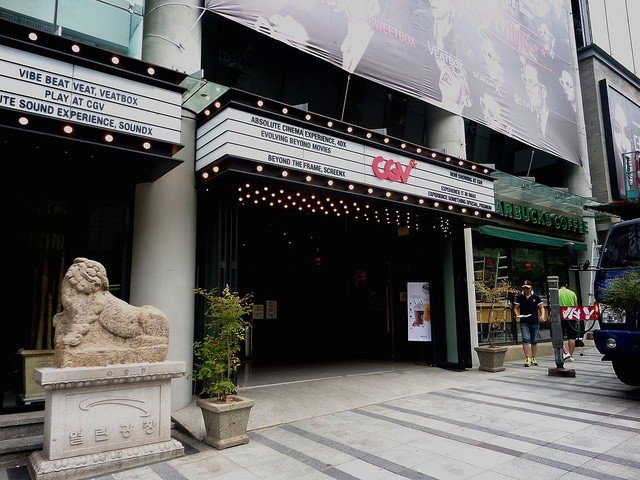
Photo: TFurban
First of all, you can easily reserve tickets for a movie through Korean smartphone apps. If some problem with your schedule comes up, many theaters have a refund policy if you cancel before the movie starts (depending on the movie theater). Knowing the language will help if the app is only in Korean.
Secondly, many Korean theaters have movies that start well into midnight. You may find yourself going to a movie at 3:00 am!
Thirdly, you can cuddle up with your significant other during your movie by reserving a couple of seats, often on the top row. CGV calls them “Sweetbox” seats, and they have a foldable armrest for a loveseat-style feeling at the movies.
Here are basic Korean words and phrases to help you understand the Korean language on the movie reservation apps or speak Korean to movie theater staff.
| English | 한국어 (Korean) | Romanization |
|---|---|---|
| Are there any seats available for the 7:30pm showing? | ilgopsiban sangyeong jari isseoyo? | |
| Are there subtitles for this movie? | yeonghwa jamak isseoyo? | |
| What time is Parasite the movie showing? | gisaengchungyeonghwaneun eonje sangyeonghaeyo? | |
| What is the genre of the movie? | yeonghwaneun museun jangneueyo? | |
| How long is the movie? | yeonghwa sangyeong sigani eolmana dwaeyo? | |
| Where is Theater 12 | yeonghwagwansibigwan eodie isseoyo | |
| Where is the concession stand? | maejeomeun eodi isseoyo? | |
| I’d like two tickets for Train to Busan the movie | busanhaeng yeonghwaneun dujang juseyo | |
| How much are the Sweetbox seats? | seuwiteubakseu jarineun eolmayeyo? | |
| Do you give discounts to students? | haksaeng harin dwaeyo? | |
| When is the last move playing? | majimak yeonghwaneun eonjeyeyo? |
Just remember to turn off your mobile phone, and don’t speak during the movie. Save your language conversation practice for after the movie is over!
Post Office Korean Phrases
The post offices in Korea have a wide variety of services, from regular domestic shipments to international airmail. Most locations also have shipping supplies right at the post office, so you can do all of your packing and shipping in one spot.
Here are Korean phrases you can use to understand the Korean language instructions or details used or to speak Korean with post office employees.
| English | 한국어 (Korean) | Romanization |
|---|---|---|
| How much is it to send by air mail? | hanggongupyeoneuro eolmayeyo? | |
| How much is the least expensive shipping option? | jeil ssan upyeon bangbeop eolmayeyo? | |
| Do I need a customs form? | segwan seoryu piryohaeyo? | |
| Please send this package by registered mail | deunggiro sopo bonaejuseyo | |
| Please send this envelope to Canada by regular mail | kaenadae bongtuupyeoneuro bonaejuseyo | |
| Where can I buy stamps? | upyeoneun eodieseo sal su isseoyo? | |
| Please give me 3 stamps | upyo sejang juseyo | |
| Do you sell envelopes? | pyeonji bongtu parayo? | |
| How long will it take to be delivered? | baesonggiganeun eolmana geollyeoyo? | |
| What is the zip code for this address? | i jusoui upyeonbeonhoga mwoyeyo? | |
| Please give me one size 3 box | samho bakseu hangae juseyo | |
| Please give me some bubble wrap | ppokppogi jom juseyo |
Note that if you’re sending a letter to Korea from outside the country, you can write the address in Korean. However, make sure to write the country name in English.
Korean Travel Phrases
Pack your bags! We’re hitting the road and going to put some of our Korean language skills to good use. Use these Korean travel phrases to help you speak with anyone you meet as you take trips throughout Korea. These travel survival phrases will help you have a fun and comfortable stay in South Korea.
Asking for Directions Korean Phrases
Ready for some adventure? It’s time to do some traveling within Korea!
Of course, we want to make your trip to South Korea as smooth as possible, so we’ll give you some common phrases in Korean you can use in case you get lost or need directions.
Whether you’re in the big city or quiet countryside, use these Korean phrases to ask the locals where something is.
Start things off with a simple 잠시만요 (jamsimanyo), and then get to chat in the local language!
Below is a list of essential Korean words and phrases to help make your visit to South Korea convenient.
| English | 한국어 (Korean) | Romanization |
|---|---|---|
| Excuse me (asking for help politely) | sillyehamnida | |
| Excuse me (asking for help) | jeogiyo | |
| I’m lost | gireul ireobeoryeosseoyo | |
| Do you know where Apgujeong station is? | apgujeongyeok eodiinji aseyo? | |
| How far is it from here? | yeogieseo eolmana geollineunji aseyo? | |
| Is it far from here? | yeogieseo meoreoyo? | |
| It’s quite far | kkwae meoreoyo | |
| It’s not far | meolji anayo | |
| It’s close | gakkawoyo | |
| It’s not within walking distance | georeogal manhan georiga aniyeyo | |
| It’s about 1 kilometer from here | yeogieseo ilkillojeongdo meoreoyo | |
| Can you show me on the map? | jidoro boyeo jusigesseoyo? | |
| I’m sorry, I’m not from around here | mianhajiman jeoneun i geuncheo sarami aniyeyo | |
| It’s that way | geu jjogeuro gaseyo | |
| Go left | oenjjok gaseyo | |
| Go right | oreunjjoge gaseyo | |
| Go straight | jjuk gaseyo |
Hotel and Pension Korean Phrases
Staying in Korean accommodations can be a fun and unique experience. There are many interesting places to stay throughout the country. Since some of them are outside of the big cities, the staff may not be used to speaking English as in other tourist areas, so it’s good to know a bit of the Korean language.
That’s where these Korean phrases for accommodations will come in handy!
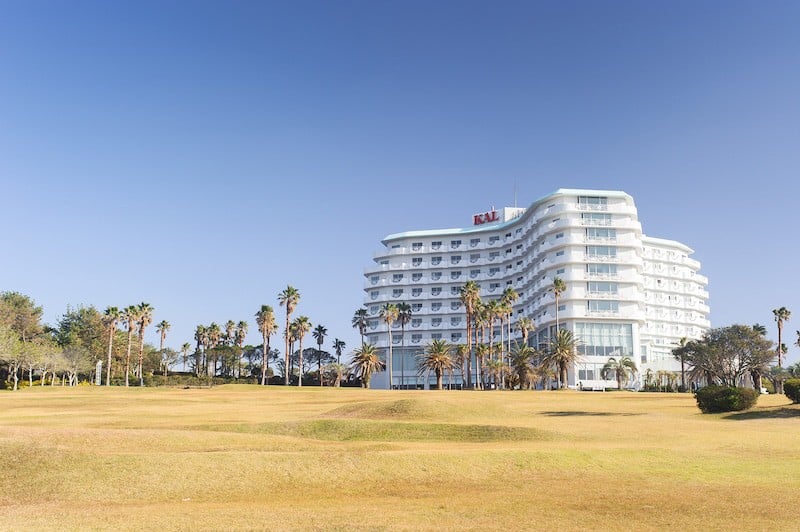
Use these Korean phrases to help you speak the local language at hotels and pensions (B&Bs) in Korea.
| English | 한국어 (Korean) | Romanization |
|---|---|---|
| Do you have any rooms available? | binbang isseoyo? | |
| I would like to make a reservation | yeyageul hago sipeoyo | |
| Did you have a reservation? | yeyageun hasyeotseumnikka? | |
| I have a reservation | ne, yeyakhaesseoyo | |
| I don’t have a reservation | ajik yeyageul haji anasseoyo | |
| How much is a room for one night? | harue bangi eolmayeyo? | |
| Is breakfast included with the room? | yogeume josigeun pohamdoeeo isseoyo? | |
| How long would you like to stay? | myeot bageul hasil geomnikka? | |
| May I see the room first? | bangeul meonjeo bwado dwaeyo? | |
| I will stay for four night(s) | sail mukgesseoyo | |
| May I have your name? | seonghameul malsseumhaejuseyo | |
| Can you wake me at 7 o'clock? | ilgopsie kkaewojusigesseoyo? | |
| I want to check out now | jigeum chekeu authago sipeoyo |
Bus Korean Phrases
The Korean bus system is one of the best systems in the world.
The buses are fast, clean, and on time. This goes for the smaller local buses (마을 버스), the regular city buses, and even the express buses (고속 버스).
At many bus stops in Seoul, there is a digital display that shows which buses are coming and what time they will arrive. It’s very accurate!
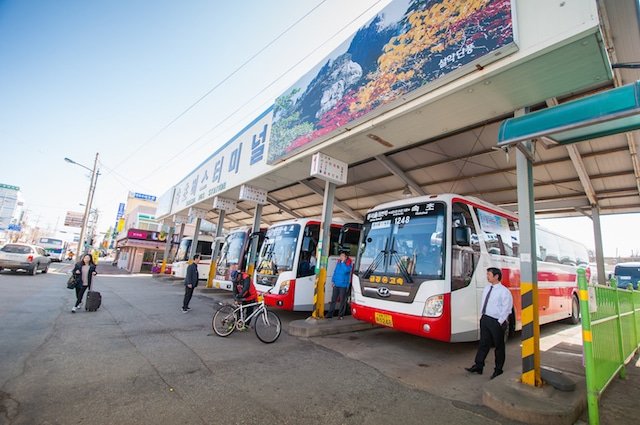
If you really want to dial in your schedule down to the minute, you can download applications to tell you which bus will arrive at certain times. That way, you can check the bus arrival times before you get to the bus stop. This is especially useful when during the winter. You may want to stay in that warm cafe or restaurant as long as possible and walk out to your bus right as it arrives.
The Korean phrases below will help you with regular city buses. There are also basic Korean phrases to help you book bus tickets from different parts of the country at the various terminals around Korea.
Charge up your T-Money card, and go for a ride!
| English | 한국어 (Korean) | Romanization |
|---|---|---|
| Please stop the bus here | yeogiseo sewo juseyo | |
| Please open the bus door | beoseu mun yeoreo juseyo | |
| What time is the last bus? | majimak beoseu eonjeyeyo? | |
| How much is the bus fare? | beoseu yogeum eolmayeyo? | |
| Where can I charge my bus card? | beoseu kadeu eodieseo chungjeonhal su isseoyo? | |
| How much is a bus ticket to Seoul? | seoure ganeun beoseu pyoga eolmayeyo? | |
| One ticket to Gangneung, please | gangneunge ganeun pyo han jang juseyo | |
| Where does this bus go? | i beoseuneun eodiro gayo? | |
| Where is the bus to Jinju? | jinjue ganeun beoseuneun eodie isseoyo? | |
| Are there tickets available for the 3pm bus to Geo Je Island? | sesie geojedo ganeun beoseu jari isseoyo? | |
| Does this bus stop in Incheon International Airport? | i beoseuneun incheongukjegonghange seoyo? | |
| When does the bus for Sokcho leave? | sokchoe ganeun beoseuneun eonje chulbalhaeyo? | |
| When does bus number 605 arrive? | yukbaegobeon beoseuneun eonje dochakaeyo? | |
| When will this bus arrive in the Namsan Tower? | i beoseuneun namsantawoe eonje dochakaeyo? |
Note that some of the bus information may be in English, but not all of it. Knowing a bit of Hangeul will help you, especially when you leave big cities such as Seoul or Busan.
Useful Korean Phrases
In this section, you’ll learn all about the useful Korean phrases for different situations you’ll possibly be in when visiting or staying in Korea.
Here are some fantastic Korean phrases you can use for different social situations. For example, you may use these when you meet your Korean friends.
If you’re not confident about talking 100% in Korean, then just start small. Use a mix of Korean and English in your sentences to get some language practice. For example, you can talk in 10% Korean and 90% English. Then as you improve your ability to speak in Korean, you can increase it to 20% Korean and 80% English.
The more you practice, the more comfortable you will be with the language. It may be challenging at first, but you’ll thank yourself later when you’re having smooth conversations in Korean.
Dinner Table Korean Phrases
Korea has a strong food culture. Along with that comes a wide range of interesting Korean phrases that will allow you to express your feelings in unique ways. There are similar phrases in English, but the Korean version may be used differently.
For example, you say, “I will eat well” before eating your meal. This is the way that Koreans show gratitude toward the person who cooked the meal. Then, instead of saying “thank you,” you’d simply say the Korean word 잘 먹었습니다 (jal meogeotseumnida), which means “I ate well.”
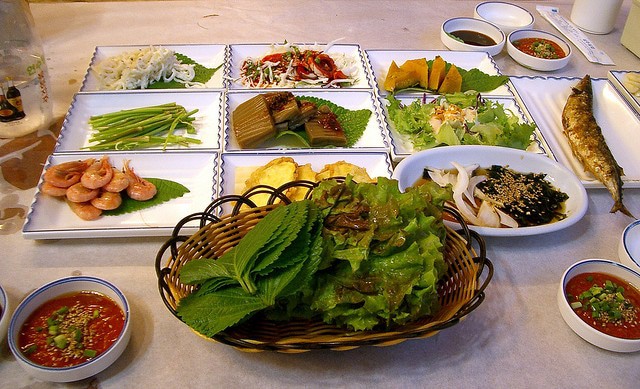
Photo: ebifry
Also, don’t be surprised if you get some shocked looks when telling Koreans that you’re vegetarian! For Koreans, barbecuing meat is almost a religion. It’s hard for them to imagine living without that tasty part of their cuisine.
Below are basic Korean words and phrases that’ll come in handy when dining out in Korea or with your friends. You’ll also often hear these words from Korean dramas.
| English | 한국어 (Korean) | Romanization |
|---|---|---|
| Bon appétit | masitge deuseyo | |
| Eat up! | mani meogeoyo | |
| I will eat well! | jal meokgetseumnida | |
| I ate well | jal meogeotseumnida | |
| It’s delicious! | masisseoyo! | |
| It doesn’t taste good | maseopseoyo | |
| I’m hungry | baegopayo | |
| I’m thirsty | mok mallayo | |
| Give me coffee please | keopi juseyo | |
| I’m a vegetarian | jeoneun chaesikjuuijayeyo | |
| I don’t eat meat | jeoneun gogireul mot meogeoyo | |
| I can eat anything | da meogeul su isseoyo |
Korean Small Talk Phrases
Concerned about first impressions?
Well, that’s great news! Koreans are very image-conscious, so it’s best to start things off on the right foot.
And what better way of doing that than to use some Korean phrases for small talk!

Get these Korean phrases under your belt, and you’ll be well on your way to breaking the ice with anyone you meet.
Since you’ll be talking in Korean, you can also get your own Korean name. Here’s a complete guide on how to do it.
| English | 한국어 (Korean) | Romanization |
|---|---|---|
| Nice to meet you | mannaseo bangawoyo | |
| What is your name? | ireumi mwoyeyo? | |
| My name is John | je ireumeun jonieyo | |
| Where are you from? | eodieseo wasseoyo? | |
| I’m from U.S. | jeoneun migugeseo wasseoyo | |
| How old are you? | myeot sarieyo? | |
| I’m 24 years old | jeoneun seumul nesarieyo | |
| I can’t speak Korean well | hangungmal jal motaeyo | |
| I’m learning Korean these days | yojeum hangungmal baewoyo | |
| What is your job? | jigeobi mwoyeyo? | |
| My job is amodel | je jigeobeun moderieyo | |
| Really? | jeongmallyo? | |
| Where do you live? | eodie saseyo? | |
| Are you married? | gyeolhonhaesseoyo? | |
| Do you like exercise? | undongeul joahaeyo? | |
| I like Carrot cake | danggeunkeikeureul joahaeyo |
Meeting Friends Korean Phrases
Imagine that you run into your long-time Korean friend. You probably have a lot to catch up on!
A lot of the phrases you’ll use in Korean for this situation are similar to what you’d say in English.

If you study the basic Korean words and phrases below, you’ll have a lot to talk about when you meet your friends. All of the phrases are in standard language, so you can use them to speak with anyone. If you’re talking with a close friend, you may want to speak using informal language by dropping the 요 (yo).
| English | 한국어 (Korean) | Romanization |
|---|---|---|
| Long time no see | oraenmanieyo | |
| Have you eaten? (showing concern) | bap meogeosseoyo? | |
| How are you? | jal jinaeyo? | |
| How have you been? | jal jinaesseoyo? | |
| What have you been up to? | eotteoke jinaesseoyo? | |
| Where shall we go? | eodiro galkkayo? | |
| Say hi to brother for me | hyeonghante anbu jeonhae juseyo | |
| Get home safely | jibe jal deureogayo |
Special Occasion Korean Phrases
If you’ve been to or lived in Korea, then you know that Koreans love to celebrate!
The big cities stay open all night long, with people roaming the streets until the sun comes up—and even after.
The next time you’re along for the celebration, use these Korean phrases to fit in with the group.

As you go over the phrases, you’ll notice that some of them are Konglish (Korean + English), and some are specific to the Korean language. For example, “Merry Christmas” is sounded out in Hangul. On the other hand, “Happy New Year” does not sound like an English phrase at all. Instead, its English translation is, “I hope you will receive a lot of good luck next year.”
| English | 한국어 (Korean) | Romanization |
|---|---|---|
| Happy Birthday | saengil chukahamnida | |
| Merry ChristmasHow to Say “Merry Christmas” in Korean | meri keuriseumaseu | |
| Happy New Year!How to Say “Happy New Year” in Korean | saehae bok mani badeuseyo! | |
| Happy Chuseok! | jeulgeoun chuseok bonaeseyo | |
| Happy Valentine's Day!Valentine’s Day in Korea – What to expect during this love holiday | haepi ballentain dei! | |
| Cheers!How to Say “Cheers” in Korean | geonbae! | |
| Congratulations! | chukahaeyo |
If you’re looking for more phrases for Valentine’s Day, check out: https://www.90daykorean.com/korean-valentines-phrases/
Phone Call Korean Phrases

How often do you pick up the phone and hear Korean spoken on the other end?
If you’re living in Korea, chances are quite often!
Learning to speak on the phone can be challenging, especially since you can’t rely on body language or visuals to help make out words. For many, trying to speak on the phone is the part of language learning that gives them the most trouble.
Well, today, we will help you get a few steps ahead of the game by giving you some common expressions that people use to speak on the phone.
The phrases below are written in standard language form. Not only do they use polite language, but you can use them to comfortably speak with those older and younger than you. You may hear the other person speak using slightly more formal versions of these phrases, but it largely depends on who you are talking to. Most often, this happens when you call into an office or company.
The next time you make or receive a phone call in Korean, you can speak with confidence!
| English | 한국어 (Korean) | Romanization |
|---|---|---|
| Hello? (on phone) | yeoboseyo? | |
| Who is calling please? | nuguseyo? | |
| Can I speak to Ella please? | ellassiwa tonghwa hal su isseulkkayo? | |
| Just a moment please | jamsiman gidaryeo juseyo | |
| Brownisn’t in at the moment | beuraunssiga jarireul biwosseoyo | |
| Should I tell Mike to call you back? | maikeussiege dasi jeonhwaharago halkkayo? | |
| Would you like to leave a message? | mesejireul namgisigesseoyo? | |
| Shall I take a message? | meseji namgyeo deurilkkayo? | |
| I will connect you | jega yeongyeolhae deurilgeyo | |
| Please repeat that for me | dasi malhae juseyo | |
| Please speak up a little for me | jom deo keuge malhae juseyo | |
| I will call you back | jega dasi geolgeyo | |
| When shall I call? | eonjejjeum tonghwaga ganeunghalkkayo? |
Keep in mind that, unlike English, the phone “hello” is different from the “hello” that you would use in person.
To learn more about these phrases, you can read our article on Korean Phone Conversation.
Mobile Phone Korean Phrases
“If you were stranded on a deserted island, what three items (besides food and clothing) would you take?”
When asked this question, most people reply with “cell phone!” as their first response. How could they ever live without it? It’s an important part of most people’s lives.
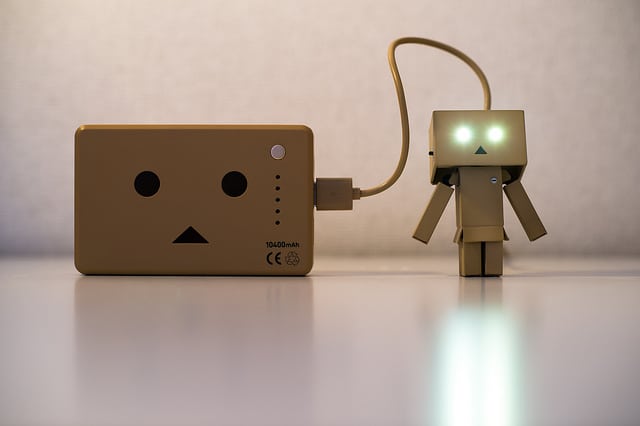
Whether or not you feel the same way, you’re likely to come across times when you’ll need to take care of your mobile phone. Below are some common Korean expressions that you can use to help you keep your phone powered up and data charged!
| English | 한국어 (Korean) | Romanization |
|---|---|---|
| Do you have electrical outlets? | konsenteu isseoyo? | |
| Where are your electrical outlets? | konsenteu eodie isseoyo? | |
| Please charge my mobile for me | hyudaepon chungjeonhae juseyo | |
| Do you sell mobile phone cases? | hyudaepon keiseu parayo? | |
| Do you sell cell phone chargers? | hyudaepon chungjeongi parayo? | |
| Can I buy a data plan for my phone? | hyudaepon deiteo peullaen sal su isseoyo? | |
| How much time is remaining on my contract? | hyudaepon yakjeong eolmana namasseoyo? | |
| Please add minutes to my phone | hyudaepon deiteo chungjeonhae juseyo | |
| Can you repair my mobile phone? | hyudaepon gochil su isseoyo? | |
| How much will the repair cost? | gochineun biyong eolmayeyo? | |
| When can I pick up my phone? | hyudaepon eonje chajeureo ol su isseoyo? |
Korean Exclamations
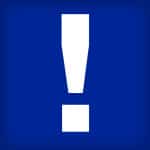
Photo: Patrick Hoesly
Remember your art teacher back in elementary school? She always encouraged you to speak from the heart and express yourself, but maybe you didn’t know what language to use.
Well, we have good news for you! Not only will you learn how to express your emotions, but you’ll also know how to speak about and convey those emotions using the Korean language.
Use these exclamations to speak your mind and express your emotions in Korean. 아싸 (assa)!
| English | 한국어 (Korean) | Romanization |
|---|---|---|
| Amazing! or Unbelievable! | daebak! | |
| What?! or Oh my god! | heol! | |
| Yay! or Hurray! | assa! | |
| Oh my goodness! | aigo! | |
| Unbelievable! or Impossible! | maldo andwaeyo! | |
| Really?! | jinjjayo? | |
| Ouch! | aya! |
Impress the Locals

Photo: Erich Ferdinand
In the Korean language, there’s a cultural phrase called 빨리 빨리 (ppalli ppalli), which means “quickly, quickly.” It’s ingrained into the personalities, activities, and mindsets of the Korean people and culture as a whole. Korea rapidly developed in a short time period. It has a massive economy compared to the size of its land and population, thanks to its ability to change, adapt, and get things done quickly.
How did they do it so fast? Well, they certainly didn’t waste time with unnecessary vocabulary!
One thing you’ll notice as you speak with Koreans is that they make efforts to shorten the way they speak. Abbreviations and word blending are common.
Below is a list of phrases that Koreans use commonly today but you won’t find in regular textbooks. They’re all rated “G,” so use them freely without worry. Don’t be surprised if you get some shocked looks from Koreans. Be prepared to explain how you know how to speak like a local!
| English | 한국어 (Korean) | Romanization |
|---|---|---|
| Self-camera | selka | |
| Company dinner | hoesik | |
| Bomb drink (i.e. boilermaker or soju bomb) | poktanju | |
| Soju and beer | somaek | |
| Chimek (chicken and beer) | chimaek | |
| Membership training (retreat) | emti | |
| Part-time job | alba | |
| Of course! | danggeun! | |
| Starbucks | byeoldabang | |
| Boyfriend | namchin | |
| Girlfriend | yeochin | |
| Free item at restaurant or store | seobiseu | |
| recognize or respect | injeong! |
Talking with the Landlord Korean Phrases
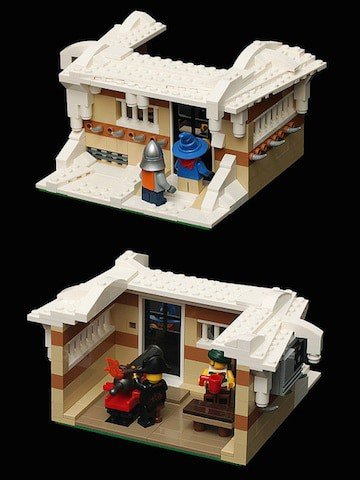
Photo: Pascal
No matter if you found your apartment yourself or your employer set you up with housing, you’re going to have to talk with your landlord at some point.
In most cases, the landlords are from the older Korean generation and don’t speak English. Therefore, simple things like asking if a package arrived for you or asking for a repair can seem like a dreadful task if you don’t know the language well. You either have to ask a Korean friend, or you have to fumble around with basic Korean and body language.
But you don’t roll like that!
Instead, make life easier for everyone by using these handy landlord Korean phrases. Your landlord will appreciate the effort, and you can get your housing business handled. Most importantly, you can spend your time talking to your Korean friend about the crazy day you had yesterday instead of the broken light in the hall.
Everyone is a winner!
| English | 한국어 (Korean) | Romanization |
|---|---|---|
| Did a package arrive for me? | sopo wasseoyo? | |
| I expect a package tomorrow | naeil sopoga olgeoyeyo | |
| My airpod is broken | je eeopasi gojangnasseoyo | |
| I’ll be on vacation from 12 July to 14 July | chirwol sibiilbuteo chirwol sipsailkkaji hyuga gal geoyeyo | |
| My hot water doesn’t work | tteugeoun muri an nawayo | |
| My hot water heater is broken | boilleoga gojangnasseoyo | |
| My sink is clogged | je singkeudaega makyeosseoyo | |
| My toilet is clogged | je byeongi makyeosseoyo | |
| The water doesn’t work | sudonmuri an nawayo | |
| The lights don’t work | buri an kyeojyeoyo | |
| The air conditioning isn’t cold | eeokeoni an siwonhaeyo | |
| The neighbors are too loud | iusi neomu sikkeureowoyo | |
| The neighbors dog keeps barking | iutjip gangajiga gyesok jijeoyo |
Apartment Search Korean Phrases
If you’ve had the pleasure of going out to find your own apartment in Korea, then you know what it’s like to be at the real estate office!

The 부동산 (budongsan) or real estate office agents are hustlers. Most of them don’t speak English, but they will usually do their best with what they know to help you find a place.
You can help move the process along by using a few of these key expressions below. The real estate agents will appreciate your efforts to speak in their language, and you’ll have a better chance of finding exactly what you are looking for. You will also have a higher chance of the landlord accepting you if you can speak Korean.
Make your house search a smooth and fun process by learning to speak a bit of the language. Then you can focus on your 집들이 (jipdeuri) or housewarming!
| English | 한국어 (Korean) | Romanization |
|---|---|---|
| I would like to find housing around here | i geuncheoui jibeul guhago sipeoyo | |
| I would like to find housing near Han River Park | hanganggongwon geuncheoui jip guhago sipeoyo | |
| I would like to find a studio apartment | wollum guhago sipeoyo | |
| I would like to find a one bedroom apartment | turum guhago sipeoyo | |
| How much is the monthly rent? | wolse eolmayeyo? | |
| How much is the deposit? | bojeunggeum eolmayeyo? | |
| How far is it from the subway station? | jihacheollyeogeseo eolmana geollyeoyo? | |
| This is too small | neomu jagayo | |
| This is too big | neomu keoyo | |
| This is too expensive | neomu bissayo | |
| I don’t really like it | byeollo an joayo | |
| I like this place a lot | i jip maeume deureoyo |
Dating & Romance Korean Phrases

Got a big date with a Korean coming up this weekend?
Or maybe you have a special someone in mind who you want to meet up with, but you’re not quite sure how to ask.
We’ve got you covered! Use the phrases below to set up your date, pay a compliment, or help move the relationship forward.
If you need more dating and relationship phrases, stop by our Korean Love Phrases page for a complete list of things to say. And if you need some sweet things to say to your significant other, here’s what you need.
화이팅!
| English | 한국어 (Korean) | Romanization |
|---|---|---|
| What is your phone number? | haendeupon beonhoga mwoyeyo? | |
| Let’s talk on KakaoTalk | uri kakaotok haeyo | |
| Do you have time this weekend? | jumare sigan isseoyo? | |
| Are you available break time? | swineun sigane sigan isseoyo? |
|
| I’m busy on Monday | woryoire bappayo | |
| Shall we go on a date together? | uri deiteu halkkayo? | |
| Shall we get dinner together sometime? | eonje uri gachi jeonyeok meogeulkkayo? | |
| You are pretty! | yeppeoyo! | |
| You are handsome! | jal saenggyeosseoyo! | |
| You are charming! | maeryeokjeogieyo! | |
| That was a great evening | jeulgeoun jeonyeogieosseoyo | |
| When shall we meet again? | eonje dasi bolkkayo? | |
| Will you be my boyfriend/girlfriend? | uri sagwillaeyo? |
Taxi Korean Phrases
If you’re living in Korea, then you know how great the taxi system is. The cars are clean, the fares are inexpensive, and it’s usually quite easy to find one.
If you’re not living in Korea and you’re planning a visit, then you can make your trip go even smoother by learning a few taxi phrases.
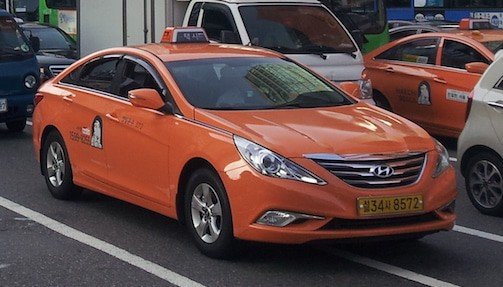
Although some areas have international taxis that speak foreign languages, the majority of the taxi drivers still mainly speak Korean. They may know how to speak a few words in English, Japanese, and Chinese, but it can sometimes be challenging to tell the driver where to go if you don’t speak the same language. This goes doubly if you live in an area with many twisty side streets—something that Korea is quite famous for!
Take a few minutes and learn how to speak some of the common taxi phrases. Not only will you make sure you get to your destination smoothly, but you’ll likely have a more interesting experience. Taxi drivers are usually friendly, so by showing that you speak Korean even a little, you’ll often have a fun conversation on the ride there!
| English | 한국어 (Korean) | Romanization |
|---|---|---|
| Where shall I go? | eodiro galkkayo? | |
| Please take me to Sinsa-dong | sinsadongeuro gajuseyo | |
| I will give you the address | jusoreul allyeo deurilgeyo | |
| Please go left at Apartment | apateueseo jwahoejeonhae juseyo | |
| Please go right at Hospital | byeongwoneseo uhoejeonhae juseyo | |
| Please go straight at Crossroads | sageorieseo jikjinhae juseyo | |
| Please make a u-turn at Cafe | kapeeseo yuteonhae juseyo | |
| Please stop at Seoul station | seoullyeogeseo sewo juseyo | |
| Please stop in front of Theater | yeonghwagwan ape sewo juseyo | |
| Please stop before Gang-nam station | gangnamyeok jeone sewo juseyo | |
| Please stop after aBus stop | beoseujeongnyujang jinaseo sewo juseyo | |
| Goodbye (to the person leaving) | annyeonghi gaseyo | |
| Taxi driver | gisanim |
Emergency Korean Phrases
Korea is a very safe country, so hopefully, you will have a safe and pleasant time here. However, emergencies do happen, and it’s always good to know a few key phrases to help make sure that you navigate through them smoothly!
Practicing these phrases and showing how to speak them in calm situations will ensure that you know how to use them when it counts.
Below are some important emergency Korean phrases. Learn them so you have them ready in case of an emergency. You will thank yourself later!
| English | 한국어 (Korean) | Romanization |
|---|---|---|
| This is an emergency | aju geupaeyo | |
| Where is the nearest police station? | jeil gakkaun gyeongchalseoga eodiyeyo | |
| Where is the closest hospital? | gajang gakkaun byeongwoni eodiyeyo | |
| Please call an ambulance | gugeupchareul bulleo juseyo | |
| Please take me to the hospital | byeongwone deryeoga juseyo | |
| Please help me | dowajuseyo | |
| Please call the US Embassy immediately | jeuksi miguk daesagwaneuro jeonhwahae juseyo | |
| Where can I get help? | eodieseo doumeul guhal su isseoyo? | |
| I am a diabetic | jeoneun dangnyoga isseoyo | |
| I am allergic to cucumber | oie allereugiga isseoyo |
Encouragement Korean Phrases
Everyone faces challenges or gets down and out at times. In those situations, you may want to cheer up a friend or show encouragement to a loved one. Luckily, there are plenty of Korean phrases of encouragement to do just that!
S0me of these basic Korean phrases have cultural nuances exclusively relatable to Korean culture, so they might not be the phrases that you’d use in English. For example, you’ll often hear the Korean phrase 화이팅 (hwaiting) in situations where English speakers would normally say “good luck.”
Another example is the phrase 힘내세요 (himnaeseyo). This is commonly used in Korean, but it’s not used the same way or as often in English.
Here is a list of encouraging Korean phrases.
| English | 한국어 (Korean) | Romanization |
|---|---|---|
| Persevere! (cheer) | hwaiting! | |
| Cheer up | himnaeseyo | |
| Don’t give up | pogi hajimaseyo | |
| Don’t worry | geokjeong hajimaseyo | |
| It’s OK | gwaenchanayo | |
| You can do it! | jalhal su isseoyo! |
Special Korean Phrases
These are super fun! We have onomatopoeia in English already, but mimetic words are something new. Give them a try and express yourself on another level!
Mimetic Korean Phrases

In Korean, there are special kinds of vocabulary words that are used to help paint vivid pictures of situations of moments. They’re called 의태어 (uitaeeo), or mimetic words in English.
These types of words are similar to onomatopoeia, except they take it a step further by describing movement instead of just a sound.
For example, you might want to talk about how hot the weather was outside. You can be describing the hot sun with words such as “scorching” or “blazing.” Or, in Korean, you can spice things up by saying the sun was 쨍쨍 blazing hot. Think of the 쨍쨍 (jjaengjjaeng) as describing the movement of the sun’s rays on a hot summer day. That extra 쨍쨍 may help you get the tan you were looking for!
| English | 한국어 (Korean) | Romanization |
|---|---|---|
| Twinkling or glittering | banjjakbanjjak | |
| Heart throbbing | dugeundugeun | |
| Streaming or dripping water | jurukjuruk | |
| Thump noises | kungkung | |
| Blazing hot sun | jjaengjjaeng | |
| Gentle soft breeze | solsol | |
| Soft and chewy food | mallangmallang | |
| Moving up and down | deulsseokdeulsseok | |
| Cringe | ogeurogeul | |
| Sneaking in | salgeumsalgeum |
Related lessons: Korean Mimetic Words
Korean Onomatopoeia
Raise your hand if you know what the word “onomatopoeia” means!
It seems like a long word, but really it’s just a fancy name for a word that imitates common sounds that we hear.
In Korean, the word for onomatopoeia is 의성어 (uiseongeo). Here, we will go over some onomatopoeia Korean phrases.
Some of the most common onomatopoeia we hear about when we were kids are those of farm animals. Does anyone know what sound a cow makes in English? How about a pig?
Well, Korean has these words, too! They’re really fun words to learn because you can compare them to the sounds of the animals from your native language and see if they’re the same.
In addition to animal sounds, there are also words for everyday sounds, such as snoring, crying, and a doorbell ringing.
| English | 한국어 (Korean) | Romanization |
|---|---|---|
| shushing | swit | |
| knocking | ttokttok | |
| doorbell ringing | dingdong | |
| car honking | ppangppang | |
| kissing | jjok | |
| heart beating | dugeundugeun | |
| sneezing | echwi | |
| crying | eongeong | |
| laughing | hahaha | |
| snoring | deureureongdeureureong | |
| pig oinking | kkulkkulkkul | |
| dog barking | meongmeong | |
| cat meowing | yaong | |
| pigeon sound | gugu | |
| cow or sheep sound | eumme | |
| duck quacking | kkwaekkkwaek | |
| mouse squeaking | jjikjjik |
Formal vs Informal Korean Phrases
The Korean language has many levels of formality. Because of this, saying simple things can seem extremely complex because of social hierarchies.
It’s helpful to know a bit about formal vs. informal language in the Korean language. They will help you understand the most important Korean phrases.
If you’re learning Korean but you don’t have Korean ancestry in your family, then you’re in the clear! You can get by with the standard forms of the language, and you’ll still be considered polite. That way, you can learn some simple or basic Korean phrases without having to know all of the intricacies of the language.
Since there are different forms of Korean, you may occasionally hear more formal versions of the phrases below. However, we’ve given you the 20% of the phrases you’ll hear 80% of the time so you can learn Korean fast.
Other helpful resources for learning Korean
Before we wrap it up, here are more helpful articles related to learning the Korean language.
- Korean Grammar – https://www.90daykorean.com/korean-grammar/
- Korean Nouns – https://www.90daykorean.com/korean-nouns/
- Korean Verbs – https://www.90daykorean.com/korean-verbs/
- Korean Adjectives – https://www.90daykorean.com/korean-adjectives/
- Korean Adverbs – https://www.90daykorean.com/korean-adverbs/
- Korean Sentence Structure – https://www.90daykorean.com/korean-sentence-structure/
Wrap Up
We hope you had fun learning a new language and loved this list of Korean phrases. One of the best ways to learn these basic Korean phrases is to speak them on a daily basis. The more you use and practice them, the easier it will be for you to speak Korean well. If you live in Korea and have Korean family members or Korean speakers to interact with, then you have many opportunities to practice and speak Korean.
You could also try language exchanges or meet some Korean friends online. Inside the 90 Day Korean members area, we have live training sessions where you can get speaking practice in Korean. This is included with the step-by-step structured online course, which will teach you how to have a 3-minute conversation in the first 90 days.
What is your favorite Korean phrase? Let us know in the comments below! If you’re still up for learning Korean, how about learning Korean slang words next? We have a complete list in this separate article!

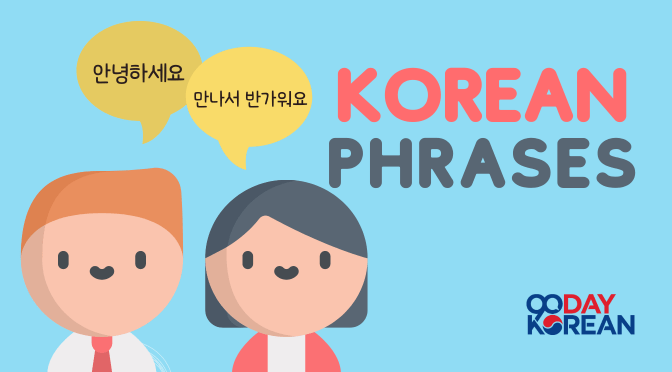



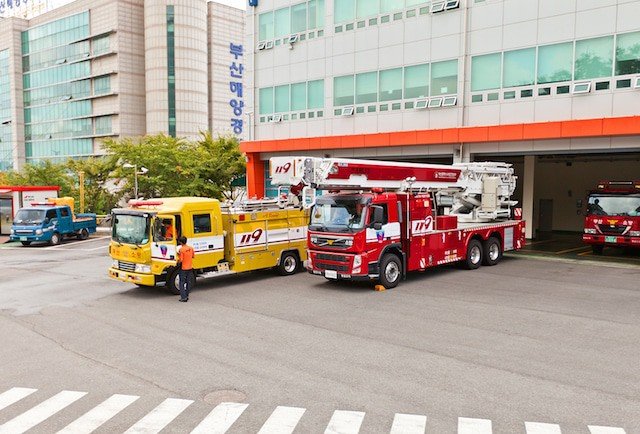






천만에요 is not commonly use, right?
It isn’t the most common one, but they are still used. You may hear 아니에요 or 뭘요 more often, in casual conversation.
Thank you so much you guys have helped so many people including me! 너무너무너무 감사합니다 😀
Also sorry but would it be ok to do one about long sentences for talking in public e.g I am feeling sick please can you get me a tablet.
Sorry again you don’t have to do a page about this, it is just a request if you can! 🙂 Thank you so so much.
Thanks for your comment! We’ve noted your request, and have passed it onto to our lesson development team. We dont’ guarantee that they’ll create it, but if they do, it will appear on our blog or YouTube channel. Happy studying! ^^
thank you very much IT HELPS A LOT
Great, thanks for your comment! I’m glad that our article has been helpful to you, Cassandra! ^^ If you want to learn more Korean lessons, you can also check our blog and visit our YouTube channel for articles and videos with great Korean content.